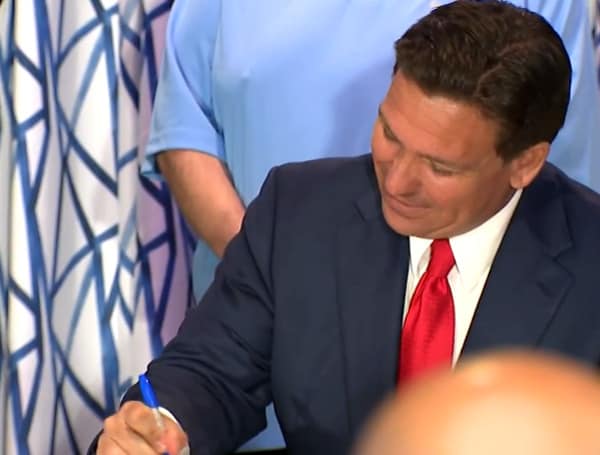Florida Gov. DeSantis Signing HB 1365 (File) Florida Governor Ron DeSantis has signed into law House Bill 1267, a piece of legislation that promis
Florida Governor Ron DeSantis has signed into law House Bill 1267, a piece of legislation that promises to revolutionize the state’s public assistance programs.
This new law, sponsored by Representative Adam Anderson, R-Tarpon Springs, seeks to address the long-standing issue of the ‘benefits cliff’ – a phenomenon that has often discouraged financial self-sufficiency among households receiving aid.
The ‘benefits cliff’ refers to the sudden loss of public assistance benefits that can occur when a household’s income slightly increases, creating a barrier to financial independence.
Read: Florida Gov. DeSantis Suspends Hialeah Councilwoman Amid Federal Fraud Indictment
This situation can lead to a dilemma for families, as they may be forced to choose between a pay raise and maintaining essential benefits, such as Medicaid, Supplemental Nutrition Assistance Program (SNAP), Temporary Assistance for Needy Families (TANF), and Temporary Cash Assistance.
House Bill 1267 aims to address this challenge by introducing several key changes to Florida’s public assistance programs. The bill targets Medicaid, SNAP, TANF, and Temporary Cash Assistance, with the goal of ensuring a smooth transition for families moving from public assistance to financial independence.
The new law introduces provisions that will help families maintain Medicaid coverage as their incomes increase, preventing the sudden loss of this vital healthcare benefit. This measure is designed to encourage financial growth without compromising access to essential medical services.
The bill also expands the mandatory SNAP Employment and Training participation for adults over 18 who do not have children under 18 in their household or qualify for an exemption. This initiative aims to provide participants with the necessary skills and resources to secure employment and become self-sufficient.
Read: Florida Gov. DeSantis Awards Umatilla And Plant City $10 Million For Infrastructure Projects
The legislation introduces a case management system for families transitioning out of the TANF program, ensuring that they receive the support and guidance needed to achieve financial independence. Additionally, the work requirements for TANF participants have been updated to include adult general education and high school equivalency exam preparation, providing more flexibility and opportunities for personal growth.
The new law also addresses the Temporary Cash Assistance program, introducing changes that will help families maintain access to this critical form of support as their incomes rise, mitigating the risk of the ‘benefits cliff.’
One of the key provisions of House Bill 1267 is the creation of the School Readiness Plus program. This initiative aims to provide financial assistance to families, allowing parents to maintain access to affordable child care.
The bill appropriates $23 million to the Florida Department of Education to implement the School Readiness Subsidy Program, further enhancing the support available to low-income households.
The analysis accompanying the bill acknowledges that the ‘benefits cliff’ is not the only obstacle faced by low-income families in Florida. The legislation also seeks to address other barriers to financial independence, including a lack of child care, education, and intergenerational poverty.
Read: Unpacking Florida’s Homestead Exemption Overhaul HB 7019 Signed By Gov. DeSantis
Promoting Self-Sufficiency
At the heart of House Bill 1267 is a fundamental shift in approach – from ‘handouts’ to ‘handups.’ The bill’s sponsor, Representative Adam Anderson, emphasizes the goal of helping families transition from public assistance to financial independence, without the fear of losing essential benefits. The legislation aims to create a more supportive and empowering environment for low-income households, ultimately fostering self-sufficiency and long-term prosperity.
The implementation of House Bill 1267 is expected to have a significant impact on the lives of Florida’s needy families. By addressing the ‘benefits cliff’ and providing a comprehensive support system, the law aims to encourage financial growth, reduce reliance on public assistance, and ultimately, break the cycle of intergenerational poverty.
The passage of House Bill 1267 has garnered support from various stakeholders, including policymakers, social service providers, and low-income families themselves. Proponents of the law believe that it represents a crucial step towards creating a more equitable and empowering system for those in need.
While the new law presents a promising solution to the ‘benefits cliff’ issue, it is not without its challenges. Ensuring the effective implementation and monitoring of the programs introduced by the bill will be crucial to its long-term success. Additionally, the ongoing evaluation and refinement of the legislation will be necessary to address any unforeseen obstacles and continue to meet the evolving needs of Florida’s low-income population.
Help support the Tampa Free Press by making any small donation by clicking here.
Android Users, Click To Download The Tampa Free Press App And Never Miss A Story. Follow Us On Facebook and Twitter. Sign up for our free newsletter.

